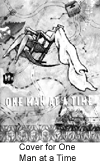
 Solitaire and One Man at a Time call to mind a pair of unlikely girlfriends who are close precisely because they have so little in common. Both titles bring fresh meat to that crammed, contentious shelf in the bookstore, women's studies, where today it seems a legion of well-meaning authors variously advise females to cleave to their husbands, embrace their libido, or follow their dream. Thankfully neither Botsford Fraser nor Simpson goes the popular prescriptive route laid down by colleagues; they simply look around at their own and other women's intimate relationships and report on what they see. Their visions are so dissimilar, though, you almost wish they'd met over a couple of low-fat decaf macchiatos, discussed their different perspectives, and written a third book about that.
Solitaire and One Man at a Time call to mind a pair of unlikely girlfriends who are close precisely because they have so little in common. Both titles bring fresh meat to that crammed, contentious shelf in the bookstore, women's studies, where today it seems a legion of well-meaning authors variously advise females to cleave to their husbands, embrace their libido, or follow their dream. Thankfully neither Botsford Fraser nor Simpson goes the popular prescriptive route laid down by colleagues; they simply look around at their own and other women's intimate relationships and report on what they see. Their visions are so dissimilar, though, you almost wish they'd met over a couple of low-fat decaf macchiatos, discussed their different perspectives, and written a third book about that.
To be fair, their methods differ widely. Simpson's personal memoir never intends to approach the scope of Botsford Fraser's book, whose straight-talking interviews with single women are mingled with feminist history and fragments of autobiography. But both books grapple with the same question¨how does a modern woman accommodate her sexuality without sacrificing her independence?¨and each book's response more or less refutes the other. I'll admit, being a 27-year-old single woman myself, I found the task of absorbing these tomes in succession rather draining, like shunting between a pair of rival palm-readers.
The fortune told by One Man at a Time is based on the assumption that a woman's life is mapped by the men she's with, and that finding one good man is her ultimate goal. The most controversial principle it propounds seems to be that a woman can have more than one long-term, monogamous relationship in her life¨and that in fact such variety can be enriching. Solitaire, on the other hand, builds on the premise that being alone is the natural state for many women. The book explores how women of all ages variously clear a cluttered life to find solitude, or, in less happy instances, find themselves trapped in bachelor apartments, and struggle to get out.
Botsford Fraser talks to widows, divorcees, unpartnered lesbians, single mothers, and those who simply choose to live alone, with precarious incomes, or with the salaries that support a growing segment of pop culture dedicated to glamourizing their lives. Solitaire exposes the stereotypes of both the old-fashioned notion of spinsterhood and the primetime glossiness of TV shows like Sex and the City and Ally McBeal. Its dry-eyed portraits of women reveling in their solitude as well as of those longing for companionship present a full spectrum of emotion, one that most unattached females will find their changing moods reflected in.
Because Solitaire is a collage of profiles, conversations, historic overviews and diary segments, you never get bored. The tone easily glides from saddened empathy to gleeful girltalk¨the latter reaching its zenith during a hilarious exchange among three single women living in Toronto. The subject is anal sex, and the women clearly relish deconstructing this bugbear of sexual politics:
NANCY: [Ó.] then he said something like, It's just another expression of love for each other.
PEGGY: It's an expression of his need to find another tight orifice to put his dick in.
NANCY: Yes. Let me just get my vibrator and go after your butt [Ó]. You have never seen a man pucker his sphincter so fast in his life. It's just another expression of love, honey! Until you're the one who's boned up the butt.
Now, who wouldn't want these women at their dinner party? Their banter may not be to everyone's taste, but their insistence on reciprocity¨be it sexual or emotional¨is shared by almost all the women profiled in Solitaire. The other echoing theme is a constant hunger for personal growth: as a single mother of five explains, "I think if I really had the opportunity to expand my brain, I could go a long way. [Ó] I can do Šmother' with my hands tied. Now I need to do something I can't do blindfolded!" [p111]
Compare that statement with one of Simpson's similes for her first marriage: "In his presence, I had begun to feel as though I was wearing my old felt hat. [Ó] From the outside it looked the same, but once it was on my head, I had the sensation my brain was being gently squeezed by a large pair of hands." [p99] Simpson's memoir is the tale of how her brain got squeezed several times over¨that first marriage lasted 15 years, whereupon she found another ailing relationship to devote 15 years to, before lucking out with a healthy third marriage¨and how she survived it.
But why, to put it bluntly, should we care? Simpson's memoir seems to have two noble aims: first, to explain how women (especially of her generation) so easily succumb to the trap of bad relationships; and second, to affirm the power of love, or something like that. The first purpose is served via sporadic ruminations on how love works in a male-dominated world: "his needs seemed more important than mine to both of us. Because I imagined he protected me from the threats of the outside world, I felt safe in the closet of my femininity." [p73] Simone de Beauvoir would have been pleased to hear she wasn't alone.
Then there are the passages that shamelessly attempt to buttonhole Cupid and make him talk. Generally quite shrewd in her character portraits, Simpson's judgment appears to veer off-course (both in life and on the page) when male quarry comes in view. Her descriptions of eligible bachelors recall the lurid flatness of film noir voiceovers: "I had never noticed Rock until late summer of 1984 when he walked into my office wearing shorts and sandals. His thick hair sprinkled with silver and his bronze tan reminded me of my father. His broad shoulders and long lashes over blue eyes reminded me I was alive." [p198] Even when she gets a chance to lay bare the genuine love she found with her third husband, it reads alarmingly like a personal ad: "When we discovered we both had a passion for health foods, foreign films, Scrabble, hiking with the dog, and reading the newspaper, weekends sped past." [p249]
And yet, despite those occasional dips into Harlequin's style guide, Simpson's prose remains oddly functional, each anecdote carefully told and then capped by a sentence neatly summarizing the lesson of the preceding paragraph. It's a perfectly adequate strategy, but eventually it begins to feel as though all events in One Man at a Time happened one at a time, in perfect narrative order, never overlapping and never just plain stopping to allow original analysis to percolate.
Perhaps that's a quibble with this particular genus of memoir, in which an otherwise ordinary person limns his or her biography as it parallels a given zeitgeist (in this case, women's lives make very marketable dust jackets). Even celebrity memoirs tend to awaken the skeptic in me, although their formula is the opposite of Simpson's: the autobiographies of renowned artists and politicians, and so on, are supposed to reveal what it is that made these people extraordinary. The type of memoir under review here, though, labours at the less glamorous task of showing how the subject is just like you or I and how, therefore, we are all more or less alike, all linked by the popular ideology that made the book possible. It's enough to make a reader bolt her door and just play solitaire.
So which is it going to be? Will Solitaire persuade imprudent housewives to leave it all behind and drive to Arizona with their girlfriends? Will One Man at a Time help unhappy singles apply mascara and track down movie-star husbands? Well, no, and no. The primary benefit of both books is the thing most women turn to other women for: voices of empathy and understanding. You read them, if you read them at all, to soothe your loneliness, to identify with others in your single or married situation. You don't read them in order to alter, much less revolutionize, your lot. That comes later, after the tea and sympathy have been digested¨and by then the books are at the bottom of a closet, long forgotten. ˛